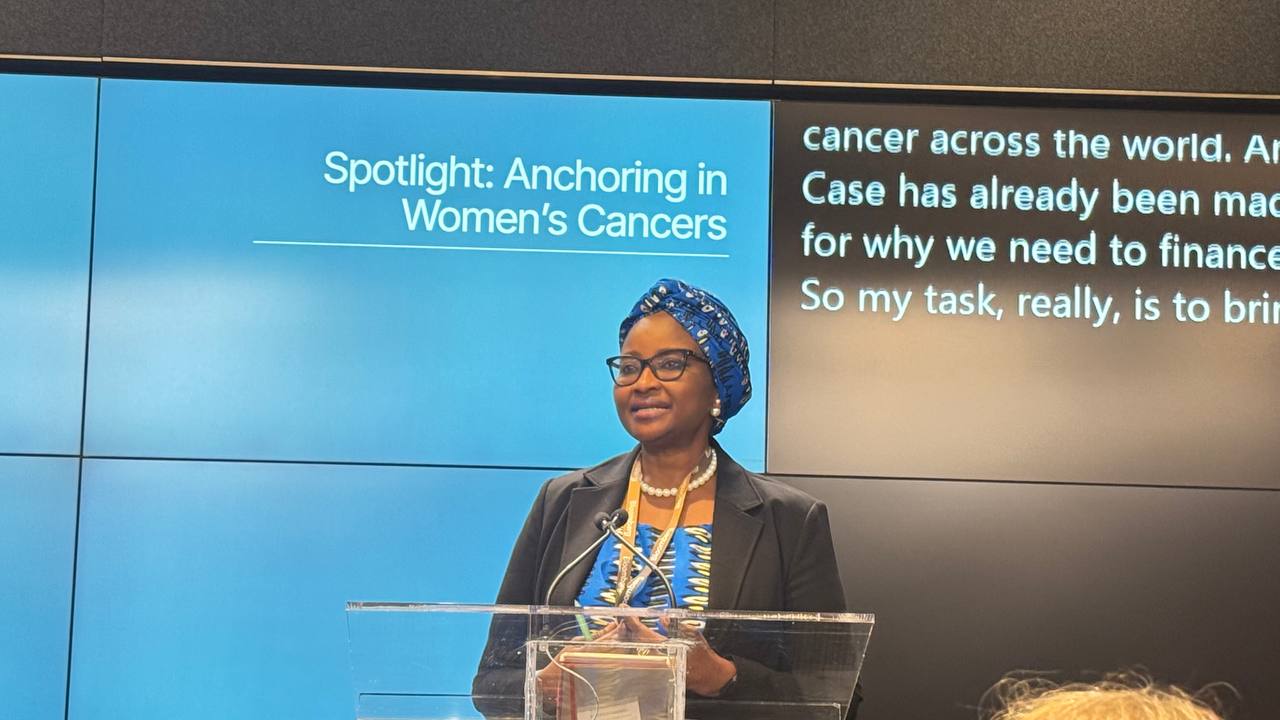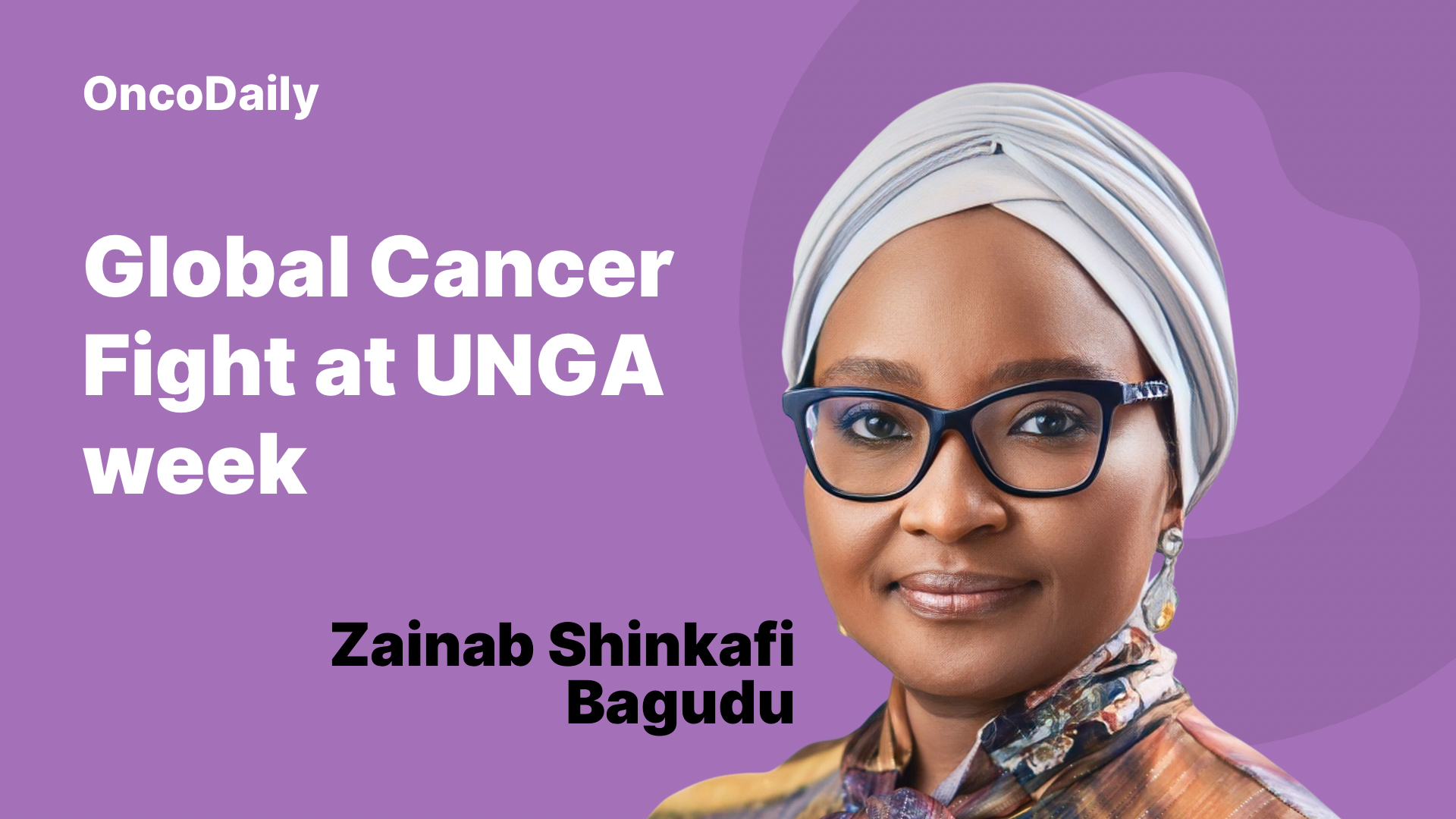Global Cancer Financing Platform — hosted by ASCO & the Bloomberg New Economy International Cancer Coalition convening in New York City featured a presentation by Dr. HE Zainab Shinkafi Bagudu outlining Uganda’s pilot to channel diaspora remittances into cancer screening, diagnostics, and treatment—built on strict transparency (“every shilling traceable”) and designed to complement, not replace, public funding.
Drawing on data from the Kampala Cancer Registry and the Uganda Cancer Institute, she situated the initiative within Uganda’s free public cancer care, dedicated UCI budget, and expansion of regional cancer centers near border corridors, emphasizing equity for refugees and cross-border patients. She closed by inviting international collaboration, noting growing interest from other countries and positioning Uganda’s model as a pragmatic pathway to earlier detection, faster treatment, and measurable capacity gains.

Background
The convening launched a catalytic effort to close cancer equity gaps by expanding access to early diagnosis and treatment in LMICs, with an initial focus on women’s cancers. Dr. Zainab Shinkafi Bagudu framed Uganda’s approach as pairing strong public provision with innovative financing that can scale regionally without displacing government spending.
Uganda’s Cancer Landscape and System Readiness
Uganda cited ~37,000 new cases and >26,000 deaths annually in a population of ~41 million, with surveillance anchored in the Kampala Cancer Registry (one of Africa’s longest running) and Uganda Cancer Institute (UCI) nationwide data. Cancer care in public facilities is free at the point of service, backed by a dedicated UCI budget for infrastructure, equipment, systems, and medicines. UCI is the East African regional center of excellence, serving Ugandans, ~2 million refugees, and cross-border patients. To improve access, regional cancer centers are being established near border corridors, bringing comprehensive services (screening, diagnostics, treatment, navigation) closer to communities.
Dr. Bagudu’s Speach
Uganda will pilot a diaspora-powered cancer financing mechanism with Global Health Catalyst and the Global Cancer Financing Platform. The aim is to channel a small, voluntary portion of diaspora remittances—a flow that exceeds FDI—into screening, diagnostics, and treatment, with three hard rules:
- Accountability by design: “Every shilling must be traceable from commitment to clinic” via transparent flows and clinic-level investment logs.
- Complementarity: Diaspora giving augments, never replaces, public financing.
- Learning agenda: A true test-and-learn pilot with government, diaspora networks, payment providers, and civil society to find mechanisms that earn trust and demonstrate measurable impact.
How the Pilot Is Expected to Work (from the speech to implementation logic)
Channels under consideration include opt-in remittance top-ups, small per-transfer levies, dedicated giving portals, and matched-fund models spanning public, private, and philanthropic partners; oversight would rest with a compact multi-stakeholder steering group—government, UCI, diaspora representatives, and technical partners—responsible for spend eligibility, quarterly reporting, and audits; transparency would be ensured through public dashboards that display inflows by channel and outflows by facility or program, alongside clinic-level procurement and service-delivery indicators; safeguards would ring-fence funds for predefined uses such as HPV tests, pathology consumables, chemotherapy stocks, and radiotherapy maintenance, with strict non-substitution of the existing MOH/UCI budget.
What Success Looks Like (initial KPIs Uganda flagged as priorities)
- Earlier detection: ↑ screening coverage (e.g., HPV testing/VIA), ↑ breast diagnostic throughput, stage-shift at diagnosis.
- Faster care: ↓ diagnostic turnaround time (biopsy-to-report), ↑ proportion starting definitive treatment ≤30 days after diagnosis.
- Capacity & reliability: fewer stock-outs of essential cancer commodities; ↑ uptime for imaging/radiotherapy; expanded pathology throughput.
- Equity: improved access metrics in border and refugee-host districts; outreach days completed vs. planned.
Equity, Solidarity, and Personal Stakes
The address combined policy with lived experience—recent cancer losses within the speaker’s family—underscoring that cancer now touches every family. Uganda described itself as “land-linked” in East Africa and invited regional cooperation to shrink delays from suspicion to treatment.
Momentum Beyond Uganda
Platform leaders noted immediate interest from Tanzania, Gabon, DRC, Nigeria, India, and Bangladesh, positioning Uganda’s pilot as a replicable test case for LMIC cancer financing under the Platform umbrella.
Conclusion
Dr. HE Zainab Shinkafi Bagudu’s address positioned Uganda’s diaspora-powered financing pilot as a credible, accountable, and complementary lever to accelerate early cancer diagnosis and treatment within an already strengthening public system. By hard-wiring traceability, preserving government investment, and testing practical channels with diaspora networks and technical partners, the model offers a scalable path for LMICs seeking resilient, community-anchored funding. The invitation to “innovate boldly” extends beyond Uganda, signaling a collaborative momentum that can convert remittances into measurable gains in access, timeliness, and outcomes—especially for women and underserved populations.
